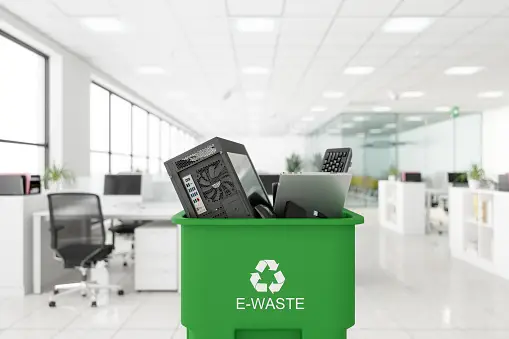
How to Make Computer Recycling Easier In 2023? In today’s digital age, computers play an integral role in our lives. From personal use to business operations, computers have become a necessity. However, as technology advances, so does the need for responsible disposal and recycling of outdated or non-functional computer equipment. In this article, we will explore various ways to make computer recycling easier in 2023, ensuring a greener and more sustainable future.
Introduction
In the era of rapid technological advancements, computers have a limited lifespan. When it’s time to bid farewell to your old computer, it’s crucial to follow the right disposal and recycling practices. Not only does responsible computer recycling help protect the environment, but it also contributes to the conservation of valuable resources.
Understanding the Importance of Computer Recycling
The Environmental Impact of Improper Computer Disposal
Improper disposal of computers and electronic waste (e-waste) can have severe consequences for the environment. Toxic materials, such as lead, mercury, and cadmium, present in computers, can contaminate soil and water sources if not disposed of correctly. Computer recycling ensures these harmful substances are safely extracted and prevents them from entering the ecosystem.
Resource Conservation through Computer Recycling
Recycling computers allows for the recovery of valuable materials like copper, gold, and aluminum. By extracting these resources from old computers, we reduce the need for mining raw materials, thereby conserving natural resources and reducing energy consumption.
Assessing Your Computer’s Disposal Options
Evaluating the Condition of Your Computer
Before recycling your computer, assess its condition. If it is still functional, you may consider donating or selling it. However, if it’s beyond repair or outdated, recycling is the most suitable option.
Backup and Secure Data
Prior to recycling your computer, ensure you have securely backed up and transferred all your important data to a new device or storage medium. This step protects your sensitive information from falling into the wrong hands.
Donating or Selling Your Used Computers
Donating Computers to Non-Profit Organizations and Schools
Consider donating your used computers to non-profit organizations or schools that might benefit from them. Many educational institutions and charities refurbish computers or use their components for educational purposes, bridging the digital divide and enabling access to technology for underserved communities.
Selling Used Computers
If your computer is still in good working condition, selling it can be a viable option. Online platforms and marketplaces provide opportunities to connect with potential buyers who are interested in purchasing pre-owned devices.
Partnering with Certified E-Waste Recycling Facilities
The Importance of Certified E-Waste Recycling Facilities
When recycling your computer, it is essential to choose certified e-waste recycling facilities. These facilities have the expertise and equipment to handle electronic waste safely and responsibly, ensuring that harmful materials are disposed of correctly and valuable resources are recovered.
Locating Certified E-Waste Recycling Facilities
Research local certified e-waste recycling facilities in your area. Check if they adhere to proper recycling practices and have certifications from recognized authorities. Many facilities also offer drop-off points for convenient disposal.
Ensuring Data Security and Privacy
Secure Data Destruction
Before recycling your computer, ensure all personal and sensitive data is permanently erased. Use data destruction methods such as wiping the hard drive, reformatting, or utilizing specialized software tools. This step guarantees that your information remains secure and confidential.
Professional Data Destruction Services
For businesses or individuals with large quantities of computers to recycle, consider employing professional data destruction services. These services ensure that data is securely destroyed following industry-standard practices, giving you peace of mind.
Read More: Top 10 Principles of Biomechanics In 2023
Embracing Sustainable Practices in Computer Manufacturing
Designing for Easy Disassembly and Repair
Computer manufacturers should prioritize designing products that are easy to disassemble and repair. By using modular components and minimizing the use of adhesives, it becomes simpler to replace or upgrade parts, extending the lifespan of computers.
Implementing Environmentally Friendly Materials
Manufacturers should also prioritize using environmentally friendly materials in computer production. Choosing recyclable and biodegradable materials reduces the environmental impact of computer manufacturing and disposal.
Promoting Awareness and Education
Spreading Awareness about Computer Recycling
Promoting awareness about the importance of computer recycling is crucial. Educate individuals and businesses about the environmental and social impact of e-waste. Encourage responsible recycling practices and provide information on available resources and facilities.
Educating on Data Destruction
Raise awareness about data security during computer recycling. Inform individuals about the importance of securely wiping personal data from devices before disposal or recycling.
Collaborating with Government Initiatives
Government Regulations and Incentives
Collaborate with government initiatives that promote e-waste recycling and enforce regulations on electronic waste management. Support policies that encourage manufacturers to adopt sustainable practices and provide incentives for individuals and businesses to recycle their computers responsibly.
Funding and Subsidies for Recycling Programs
Advocate for increased funding and subsidies for recycling programs. This helps in establishing more e-waste recycling facilities, conducting awareness campaigns, and developing innovative technologies for efficient and environmentally friendly recycling.
The Role of Businesses in Computer Recycling
Implementing Corporate Recycling Programs
Businesses should establish internal recycling programs to handle their e-waste responsibly. Provide employees with proper guidelines for recycling their computers and encourage participation in recycling initiatives.
Partnering with Certified E-Waste Recyclers
Collaborate with certified e-waste recyclers for large-scale recycling needs. Ensure that the recycling partner adheres to strict environmental and data security standards.
Building a Circular Economy for Electronics
Promoting the Circular Economy Concept
The concept of a circular economy revolves around reducing waste and maximizing resource efficiency. Promote the circular economy model in the electronics industry, encouraging repair, refurbishment, and recycling of electronic devices.
Extending the Lifespan of Electronics
Encourage consumers to extend the lifespan of their computers through regular maintenance, software updates, and hardware upgrades. This approach reduces the frequency of disposal and promotes sustainability.
Innovations in E-Waste Management
Research and Development for Recycling Technologies
Invest in research and development of innovative recycling technologies. Explore methods like advanced sorting, robotic dismantling, and chemical processes to enhance the efficiency of e-waste recycling.
Collaboration with Tech Industry
Encourage collaboration between technology companies, researchers, and recyclers to develop more sustainable electronic devices and recycling solutions. This partnership can drive advancements in eco-friendly materials, energy-efficient designs, and responsible disposal practices.
The Future of Computer Recycling
As technology continues to evolve, computer recycling will become increasingly important. The integration of circular economy principles, advancements in recycling technologies, and increased awareness will shape a more sustainable future for computer recycling.
Conclusion
In 2023, making computer recycling easier is essential for a greener and more sustainable world. By understanding the importance of responsible e-waste disposal, utilizing certified recycling facilities, ensuring data security, embracing sustainable practices, promoting awareness and education, and collaborating with government initiatives, we can contribute to a more efficient and eco-friendly computer recycling ecosystem.











